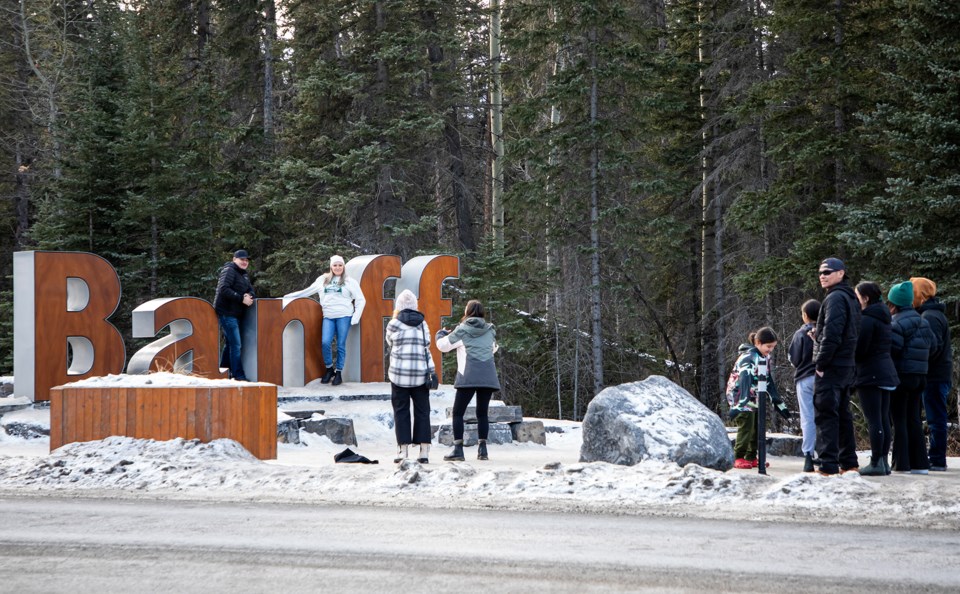BANFF – The Town of Banff is looking at possible relocation of the famous entrance sign at the west entrance to the tourist town.
Administration has been asked to bring a report to council addressing relocation of the sign from Mount Norquay Road, with consideration given to the recreation grounds, Central Park, train station and other pedestrian areas.
Councillors expressed concern about safety given hordes of tourists rushing back and forth across the busy road to take selfies in front on the sign that has now become a tourist attraction itself.
Coun. Grant Canning said he believes council needs to revisit where the sign is located.
“My biggest concern is the safety component of this, having seen the sheer number of people crossing over that road from the Fenlands parking lot,” he said.
“Our efforts to turn this into a safer environment, with the bollards slowing down traffic etc., I think those are absolutely essential, but that’s also taken away a lot of the aesthetics of coming into the community from the west side.”
The Banff entrance feature sign on Mount Norquay Road, installed in 2017, was intentionally designed to be interactive. It replaced a former sign featuring legendary mountain man Bill Peyto.
“It has proven to be a remarkably popular visitor attraction and point of interest,” said Darren Enns, director of planning and environment for the Town of Banff.
Between 2017 and 2019, a series of measures were implemented to better manage visitor impacts at the sign, including changes to the location, size and number of planters in the median, and other changes to slow and calm traffic.
Improvements were also made to the pedestrian crossing.
Enns said extensive video monitoring showed almost 90 per cent of the vehicle backups to the Trans-Canada Highway were caused by trains blocking Mount Norquay Road.
While the improvements may result in train-related back-ups taking longer to clear out, he said they were not the cause of congestion in most cases.
“Just because there’s a traffic jam and there’s a sign next to it, that’s correlation but not causality,” said Enns.
Any exploration of a relocated sign would also include remediation plans for the existing site, and potential options for creating a sense of entry to the community without the traffic congestion associated with a sign.
Coun. Chip Olver said the former sign did see the occasional visitor stop for photos and climb the peaked roof of the wooden structure but not on the level seen today with the newer Banff sign.
“Now it’s not occasionally. Now almost everyone who enters town needs to declare that they’re here on their social media by taking that photo,” she said.
If the sign gets damaged in any future potential move, Olver said she would probably not support rebuilding it.
“We’ve been too successful with the sign we have. With the huge increase in social media, it’s made a real challenge for us,” she said.
Coun. Kaylee Ram supported looking at an area that is more pedestrian-friendly, noting signs in other regions such as Toronto and Ottawa are in pedestrian-dominated areas.
“When you Google Maps the Las Vegas sign, they’ve made a whole pull-off roadway for capital traffic mitigations for tour buses and cars to pull into to take that photo for safety,” she said.
“I don’t see that being possible for the Banff sign. I think we’ve exhausted all efforts.”
There are no budget implications at this time. However, as a comparable, the capital costs for the existing sign were $120,000 for civil-base design, $100,000 for sign fabrication and $80,000 for other related costs.




